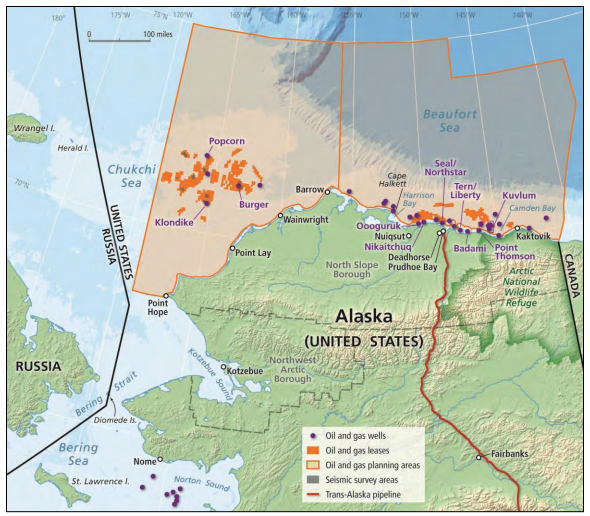
orange, with seismic survey areas shown in gray. Selected oil and gas wells, some in Alaskan state waters and some in federal waters, are shown as purple dots. Some coastal communities and cities are also shown. (Image from the National Research Council)
The National Research Council released a report on what needs to be done in order to be able to respond to oil spills in Arctic waters.
Environmental groups were quick to respond that so much needs to be done that it would be better to not drill at all.
The report has been a year and a half in the making and involved 14 experts from science and industry and hearings in Alaska and elsewhere. It gets deep into the details of what capabilities and knowledge exist and how limited they are. It deliberately avoids the question of whether to drill or not drill in Arctic waters.
The panel’s chairwoman, New York risk analyst Doctor Martha Grabowski, calls the report balanced, and says it shows many things are needed for oil spill response in the arctic that we do not yet have.
“Increased data needs, more research in terms of countermeasures, better understanding of logistics, operations and co-ordination, and then decision strategies that bring all interested parties to the table in a transparent process,” Grabowski said.
The panel recommends that authorities spill real oil into real Arctic waters to do some real testing of burning and dispersants. Studies in tanks can only go so far, says Mark Myers, research vice chancellor at the University of Alaska Fairbanks.
“To really understand and be best prepared, we’re going to have to do some controlled releases,” Myers said. “Obviously that’s an important decision to make and we recommend a process for doing that.”
“These tests we consider very important; some of the people on the panel had been involved with the earlier tests all the way going back to the 1970s, I believe, and the tests in Europe and Canada, so there’s a lot of experience and a lot of judgment on the committee and there was consensus that this was an important finding.”
The report says not nearly enough is known about how crude oil degrades in Arctic waters or what it does to the food chain. Myers says some of that has been studied, but not enough.
“A much broader more robust testing program we thought was important,” Myers said. “The work that’s been done up in Barrow is actually quite good, but it’s not as much as we’d like to see, nor is it necessarily enough of the species that we would like to see.”
Two North Slope Borough scientists were included on the panel. Coastal villages are included in the recommendations to have spill response equipment and a trained work-force available.
“Pre-deployment of those assets and budgets to maintain those assets so they don’t diminish over time is an important facet of the report,” Myers said.
The panel urges more cooperation with Russia and that language translators be identified. And it says the Coast Guard has nowhere near what it needs to do its job and has basically been piggybacking on military operations or diverting resources from other programs to support what activities it has conducted to try to be more prepared to oversee Arctic oil and gas and shipping activities.
“The gap between the activities and Coast Guard ability to support its mission for oil spill response and for vessel navigation, the gap is large and it needs to be closed,” Myers said.
Environmental groups were quick to respond to the report. Doctor Chris Krenz of Oceana says it shows our resources to deal with spills are “woefully inadequate.” Lois Epstein of the Wilderness Society, a petroleum engineer, said it looks as if they won’t have adequate preparation for Arctic offshore spills in our lifetimes, and she would like to have seen some policy conclusions.
“I find that extraordinarily unsatisfying,” Epstein said. “I’m an engineer; I’d like to see technologies used and be effective, and this report says there is no effective technology.”
Epstein put out a press release saying the report should give the industry cause to think twice about whether the payoff of any arctic offshore drilling plans would really be worth the risk.
sheimel (at) alaskapublic (dot) org | 907.550.8454 | About Steve




